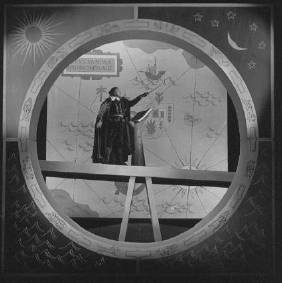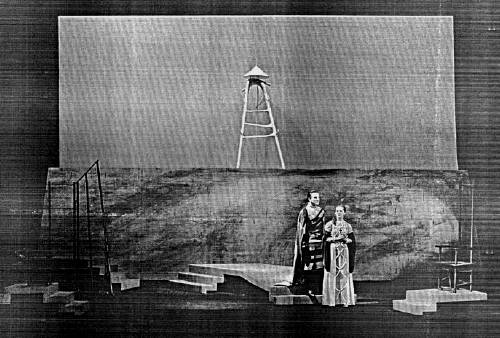Shakespeare in Poland: World War II and The Communist Regime
Shakespeare in Poland -- page 8
7. World War II and the Communist Regime: Shakespeare in the theatre of political allusions and metaphors
The years of the Second World War and the Nazi occupation 1939-1945 brought a total destruction of Polish cultural life. Theatres and actors, writers and scholars faced the same tragic possibility of annihilation. Theatres ceased to exist while many actors and writers were sent to concentration camps and any formal publications of a literary study or a scholarly paper seemed unthinkable. It was a time when Shakespeare was used for one's own needs, a time of finding answers to the questions of the meaning of life in extreme conditions. Reading his works fertilised the minds of Polish actors and poets.
Jacek Woszczerowicz (1904-1970), whose staging of Richard III in 1963 belongs to one of the most important staging of Shakespeare's plays in Communist Poland, admitted for example that his obsession with this play began during World War II. Escaping Nazi persecution, he spent the five-year war in hiding, living in an obscure village. Shakespeare's works were the only books he managed to take into this perilous seclusion (see below). Zygmunt Herbert, an eminent Polish twentieth century poets, found inspiration for many of his works in Shakespeare's plays, which he studied during the war (See Section: "Shakespeare As Inspiration").
It is possible that during World War II there were, however, secret productions of Shakespeare's plays. Since they could not be staged in any institutional theatre settings, but only in clandestine informal meetings, so far very few documents of these activities have been found. [Note 25] Marek Edelman, the last living leader of the Warsaw ghetto uprising in 1943, recalled briefly in one of his interviews that "theatrical performances took place [there]. Shakespeare was forbidden, Hamlet was then staged under the title The Danish Prince: The Drama Surveyed and Corrected by David Rubinsztajn" (1999: 38).
Soon after the end of the war, in 1947, the Shakespeare Festival sponsored by the Polish Ministry of Culture and Art revealed the important role the works of Shakespeare had come to play in the country's revived cultural life. In that watershed year, twenty-three theatres across Poland presented seventeen of Shakespeare's plays. Joanna Godlewska notes that the Festival repertory was under close scrutiny of the new Communist authorities. Those of Shakespeare's works that address the issues of the "Grand Mechanism of Power" were not staged (2001: 23). Yet the Festival was followed by press discussions, to which critics and readers contributed numerous essays, articles, and letters to editors; the main topic was a stimulating controversy on the correct interpretation and stage presentation of Shakespearean characters (Ciechowski, 1997).
|
Leon Schiller's production of The Tempest won first prize in the Shakespeare Festival. This iconic figure in the Polish theatre did not, however, enjoy his success for long. The 1949 Congress of Culture and Art condemned the newborn freedom and innovative spirit of artistic expression. Soviet Stalinism imposed Sociorealism on Polish culture, the only politically correct norm for artistic and intellectual achievement. The theatres were forced to eliminate almost all foreign playwrights and influences. Lope de Vega, Corneille, and Shakespeare as the representatives of imperialist cultures had to give space to the Soviet and Polish Sociorealist "hits." The best known of these "instant successes" was Brygada szlifierza Kurhana (Grinder Kurhan's Brigade), a play by Vaska Kania, a Czech playwright, which advocated work efficiency in a factory. Though its staging in the Łódź Nowy Theater (1950) was described as the most important theatrical event in the theatrical life of the Socialist Block (Szydłowski, 1950: 2), it was, in fact, a typical example of the Social Realist arts. [Note 26] |
 The Tempest, Teatr Wojska Polskiego, Lodz, director: Leon Schiller, 1947. Click on the image
to see a larger version. The Tempest, Teatr Wojska Polskiego, Lodz, director: Leon Schiller, 1947. Click on the image
to see a larger version.
|
Generally under the Communist regime (1945-1989) every year, ten or so Polish theatrical companies presented Shakespeare's works. The list of the performances of his plays was headed by Twelfth Night, followed by A Midsummer Night's Dream, and Hamlet. Five of his plays had to wait for almost four hundred years before they attracted the attention of Polish directors. They included: Pericles (1960), the trilogy of Henry VI (1964), Henry V (1970), Henry VIII (1976), and Titus Andronicus (1987). Most of these performances were political. In the early fifties, whenever Shakespeare was allowed to be staged, he was generally interpreted as a prophet of Marxism. Mikhail M. Morozov's interpretation became recognised by the Communist Party ideologues as the only acceptable exegesis of Shakespeare's works, and his dramas were designated to play the role of ideological denunciations of the "system of putridity of the Elizabethan epoch" (1950: 45).
Later with the demise of Stalinism (1956) Shakespeare's plays became closely associated with the world-renowned Polish theatre of "political allusions and metaphors." [Note 27] Since over centuries the oppressive regimes firmly embedded his texts in the general public consciousness as a cultural symbol, creating structures of meaning traditionally fulfilled by philosophy or religion, Shakespeare was very easily accepted as the means that effortlessly translates statements from the world of ideas into a form that means something in terms of people. The directors generally respected the text, but without slavish subservience; the actors' renditions of particular speeches implied a constant debate and negotiation with the language. The theatrical sign system became concretised: the gestural, rhythmical, dramaturgical, and narrative systems built up a comprehensive representation of the totalitarian regime in the production. Yet it did not operate at the historical level, as the sign system was usually typologized, assuming a generalised dimension.
The generation of the productions' meaning came out of a series of compound allusions and metaphors which implied the atmosphere of violence, secret police, and political despotism located in selected signs of redundancies and contradictions present in the theatrical mis en scene. The universality of the productions' concerns present in the tone and mood spoke not only about the Polish situation, but also about the pandemic predicament. Polish Communist theatre achieved mastery in appropriating Shakespeare's plays for the political and social needs of a given historical moment.
The moments of political unrest in 1956, 1968, 1970, 1976, and 1982, usually intensified the revivals of new productions, directed by such eminent Polish directors as Willam Horzyca, Krystyna Skuszanka, Lidia Zamkow, Kazimierz Braun, Jan Maciejowski, Jacek Woszczerowicz, Jerzy Jarocki, Konrad Świnarski, Jerzy Jarocki, Adam Hanuszkiewicz, Maciej Prus, and Andrzej Wajda, to name a few. In the conditions of censored disquisition, progressive elements in society saw Shakespeare in their own personal/political terms, and frequently the Polish public read definite subversive implications into performances that were apparently devoid of any political innuendoes. The theatregoers did not have any problems with "reading" these performances, after all from the Romantic period through Communist times, Polish literature centered on the fight for national independence, which often was met with eavesdropping, perjury, betrayal, and terrorism. [Note 28] The poetics of the "political allusions and metaphors" played on the Polish national ability to use writerly techniques. Privileging the Polish people's concerns over theoretical artistic issues, the productions simply reflected existing needs, and allowed for the subversive discourse to operate under the most suppressive political conditions.
In other words, under Communist regime Shakespeare assumed an iconic dimension, which was always in the process of creation: the richness of his texts allowed the incessant flow of new interpretations. "Contemporary dramatists," as one Polish critic said in 1960, "can sleep peacefully as long as Shakespeare does their job" (qtd. Fik, 1992: 141). Shakespeare's popularity was also connected with the Polish system of censorship, since his texts were usually treated as old-fashioned classics, and once the text of a production and its general outline were approved, the staging took on a life of its own. [Note 29] Reminiscing about their experience with Polish audiences, Krystyna Skuszanka, whose subversive production of Measure for Measure (1956) attracted theatre goers from all over Poland, believed that their members were expecting an opportunity to serve actively in the creation of the performance, which they wished would be a comment on their life under the offensive totalitarian regime. [Note 30]
Measure for Measure, Panstwowy Teatr Ludowy, Nowa Huta, director: Krystyna Skuszanka, 1956. Click on the image to see a larger version.
Notes
[25] There are some materials documenting productions in Cracow, The Rapsodyczny Theatre presented 22 plays. Karol Wojtyla, Pope John Paul II, acted in this theatre. [Back]
[26] The play showed conflict between two clearly delineated groups of characters, workers in a metal factory, "good communists," and "bad capitalists." The "good communist" revealed the overwhelming Social Realist schematism: literature, theatre, film, pictures, and sculptures showed happy, energetic, flesh and blood, suntanned female collective farm workers and muscular, male industrial workers with straightforward optimistic smiles. Both were dedicated builders of the new system. The 1977 Andrzej Wajda's cinematographic rendering of this period's concerns has been depicted in his Oscar nominated film The Man of Marble. [Back]
[27] As far as I know the term was used for the first time by Marta Fik (1992). [Back]
[28] During the Communist regime the ethics of revenge and the morality of betrayal at the times of the three partitions were thoroughly discussed in the primary schools with children who were not allowed to see films showing a naked woman. [Back]
[29] Only if it evoked overt political demonstrations, as was the case with Kazimierz Dejmek's production of Mickiewicz's Forefathers' Eve in 1968, did the censors ban it. I recall that in 1983, a production of Ben Jonson's Volpone, which I attended with my students in Warsaw, made me silence their discussion during the return train journey on a martial law wintry night in concern for our safety. [Back]
[30] I am quoting here from my interview with Skuszanka conducted in February 16, 1996. [Back]

